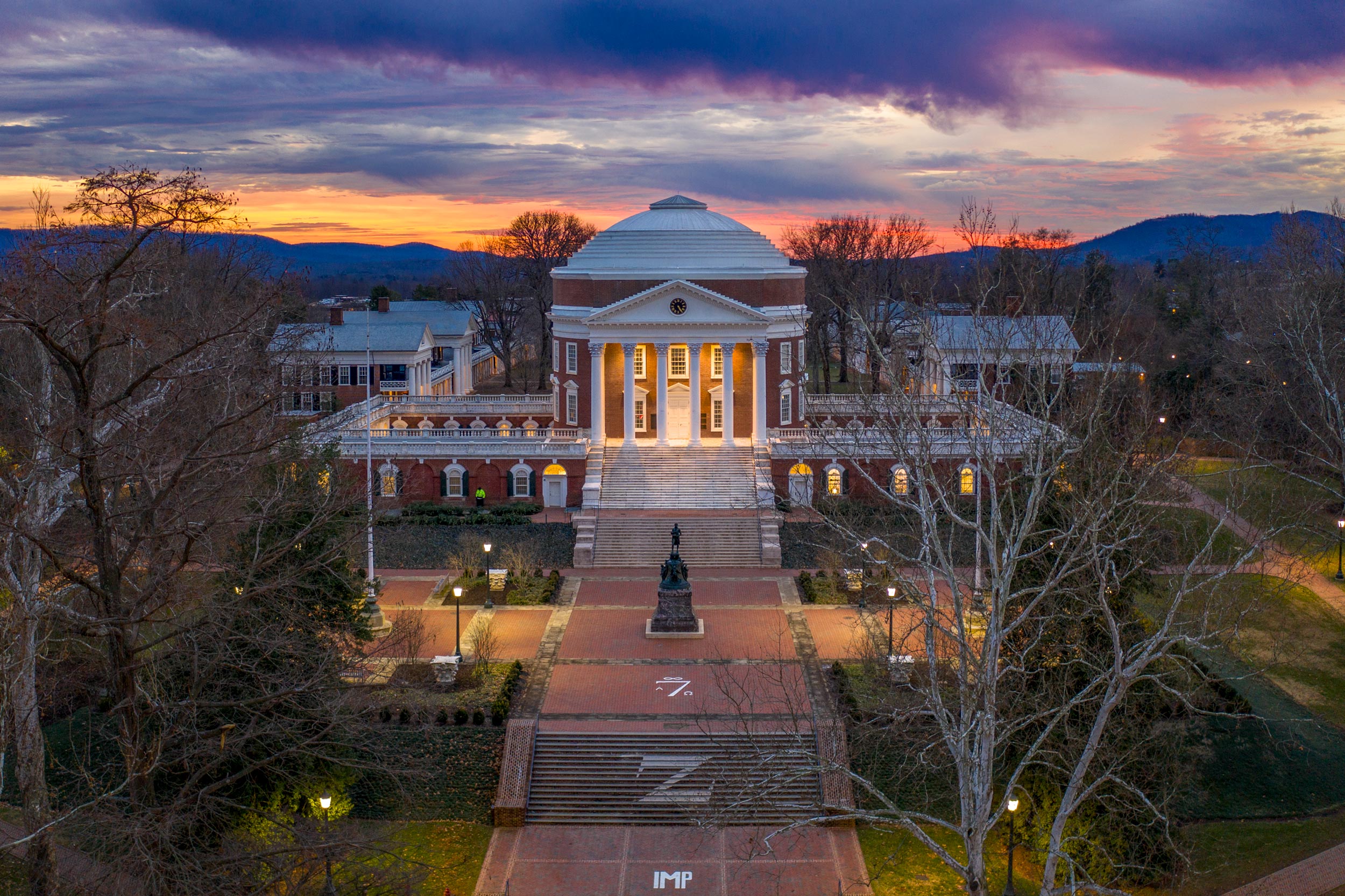When Kiara Rogers stepped foot on the University of Virginia’s Grounds four years ago, she knew she wanted to pursue a pre-law track so that someday she could give a greater voice to other women and to the causes that she believed in.
Today, that’s still pretty much what the Midlothian native wants to do.
“However,” Rogers said, “the twists and turns of my journey can only be characterized by intellectual exploration and curiosity.”
Which is precisely what UVA alumnus and Board of Visitors member John Griffin had in mind when he created the Blue Ridge Scholars program in 2014: Make a world-class education a reality for students who might have otherwise faced financial barriers.
He backed his vision with a $4 million challenge grant, fueling scholarships for admitted students who have demonstrated significant financial need and also boosting UVA’s overall financial aid endowment. Blue Ridge scholarships aim to reduce the amount of loans in financial aid packages and to attract and enroll students who otherwise might not have considered UVA.
“We seek to identify students who would not only benefit financially from the scholarship, but have the potential to become active citizen-scholars and leaders during their time at the University,” Dean of Undergraduate Admission Gregory W. Roberts said.
“Hundreds of students from all over the country have benefitted from John Griffin’s generous gift, and this is among many impactful scholarships at UVA.”
This May, the first full class of Blue Ridge Scholars will walk the Lawn.
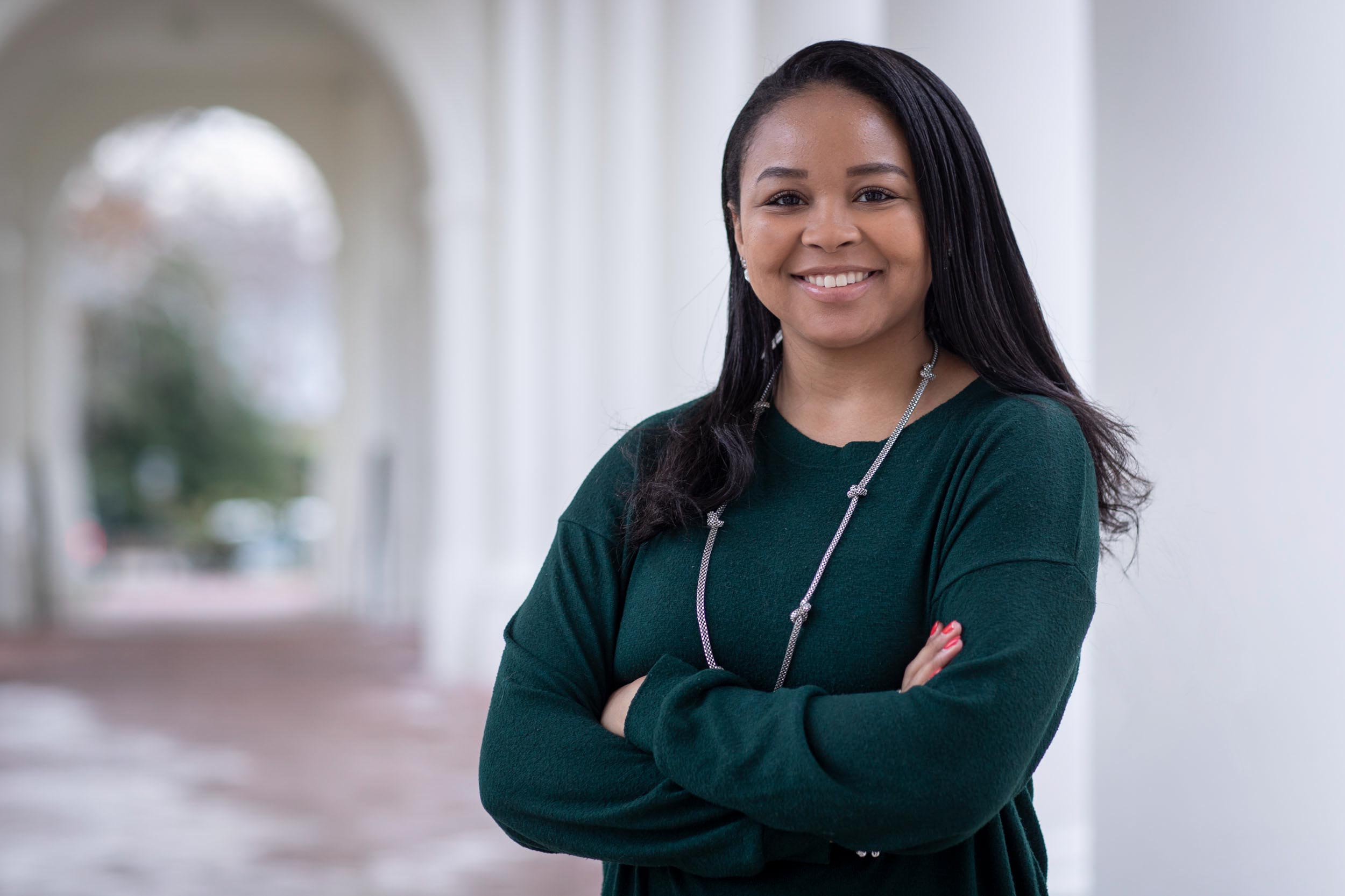
Kiara Rogers urged future Blue Ridge Scholars to “fully engulf yourself into this community, explore and take in all that this place has to offer.”
Before they embark on their post-graduation lives, UVA Today caught up with Rogers and fellow Blue Ridge Scholars Stephen Ross, Jahmila Riley, Edward Morgan and Courtney Roark for a look back at their experiences at the University and how UVA has helped prepare them for what lies ahead.
Rogers will attend law school, though she hasn’t yet decided which one. Ross will work in management consulting at A.T. Kearney in New York City. Riley will move to Los Angeles to continue working on a music business. Edwards will work for a software company in Charlottesville. And Roark will work as an archaeology field technician.
Q. How does what you thought you wanted to do when you arrived at UVA four years ago compare with what you wound up doing?
Roark: I’ve always been very passionate about archaeology and the past, and that didn’t change at all!
I thought I would double-major in biology, but I realized that my interest in the living world was more suited to the field of environmental science, and I’ll graduate with an environmental science degree.
My hobbies didn’t change too much, but my life goals certainly did. I learned how to fight self-doubt and navigate the conflicting messages and expectations that have influenced me for many years. The most important lesson, though, was how to be honest and blunt with myself about what I want and what the steps are to achieve specific goals, even when others view those goals with skepticism.
Ross: I came into UVA with the goal of getting into the McIntire School of Commerce. Fortunately, I was granted admission my second year, and had a desire to study finance and marketing. Looking back at my experience, I love how I was able to use my creative skills within my marketing concentration and hone in on my quantitative skills with finance.
I wanted to make sure that I kept up with my music. I had been playing piano and singing for over 13 years, and wanted to make an impact musically at UVA. I became a member of the Virginia Hullabahoos my first year and was musical director my second and third years. This decision was completely in line with the vision I had of my college experience, and I am grateful to have created so many different friends and memories from it.
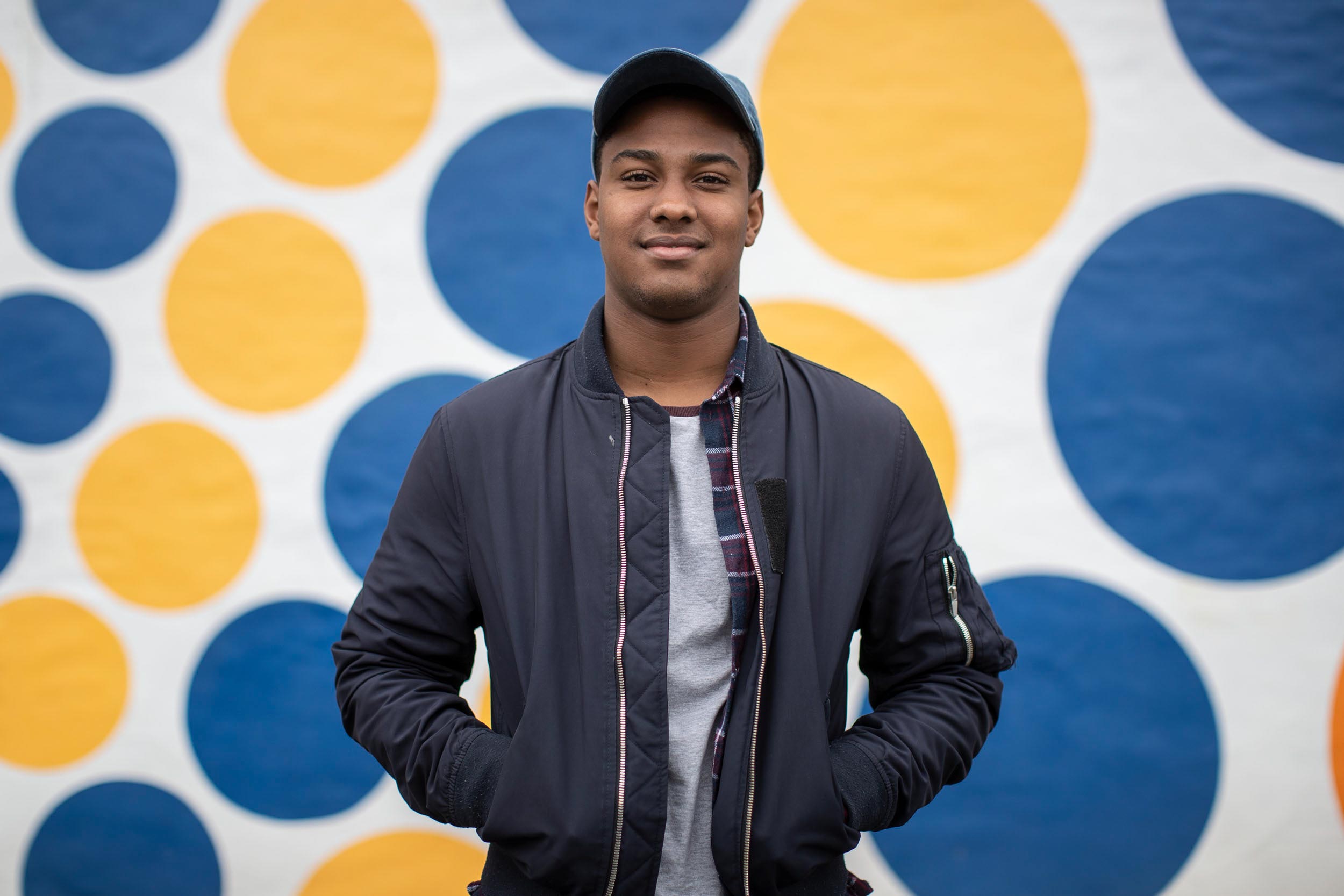
Stephen Ross recommends future Blue Ridge Scholars to “taks risks … meet people who are not like you … [and] be mindful.”
Riley: I did what I planned on doing when I first arrived here! I became an African American studies major and entrepreneurship minor. I’m not a music major, but I did take a lot of classes in that department. I got involved in a few clubs that I really enjoyed like DEAFS (Deaf Education Awareness for Students), Enrichment Alliance, NAACP and BSA (Black Student Alliance).
Rogers: UVA provided me with the opportunity to explore different opportunities, whether academic-based or ones that represented one of my numerous identities, until I discovered my true niche and honed my passions.
Today, I feel that this ability allowed me to determine that I am an individual passionate about dismantling structural socioeconomic and racial barriers via the intersection of law and policy. I wouldn’t have narrowed that focus without dipping into the University Judiciary Committee, honing my leadership and research skills through the Meriwether Lewis Institute, being a Frank Batten School of Leadership and Public Policy student, and more – all of which I had no idea I would partake in when I first arrived. So, I’m immensely grateful for being open to what would come into my life.
Morgan: Aside from wanting to do something in engineering, I wasn’t sure about what exactly I wanted to do when I came to UVA. I had been introduced to programming in my senior year of high school, so I thought a major in computer science or electrical engineering would be interesting to pursue. Not that I didn’t have doubts about whether those were right – I can remember being intimidated by how much experience other students had with engineering prior to college.
Four years later, I’m graduating with a degree in computer engineering – not too far away from what I thought I might want to do in first year. Even though I ended up not drastically changing my academic program, I still ended up being interested in fields that I never even knew existed when I started college, and I think that’s to be expected. A large part of college is taking a general idea of “what you want to do when you grow up” and exploring opportunities to pursue more specific fields that align with your interests. Although it might be scary sometimes, that’s how you grow into a professional.
Q. Looking back on your time here, what were some of your highlights and things you’ll always remember?
Ross: My biggest highlight has been spearheading the creation of the Hullabahoos album, “Derobed.” Throughout the creation process, it was great to create music and collaborate with my friends in such an endeavor. The album is now streaming on Spotify and Apple Music, so it will be something that I definitely will show my kids one day!
Rogers: As I think back to my time at the University, I am most proud of the smaller accomplishments that have characterized my journey. From personal highlights such as being the first in my family to graduate from college to academic highlights like meeting and hearing from the nation’s greatest figures (such as Anita Hill, Hillary Clinton and more) – they all will be remembered. I’ve had the opportunity to leave smiles on faces through the Peer Advisor Program, help contribute to the first-generation and low-income populations, make friends within my favorite gospel choir and other extracurricular activities, and gain an abundance of mentors.
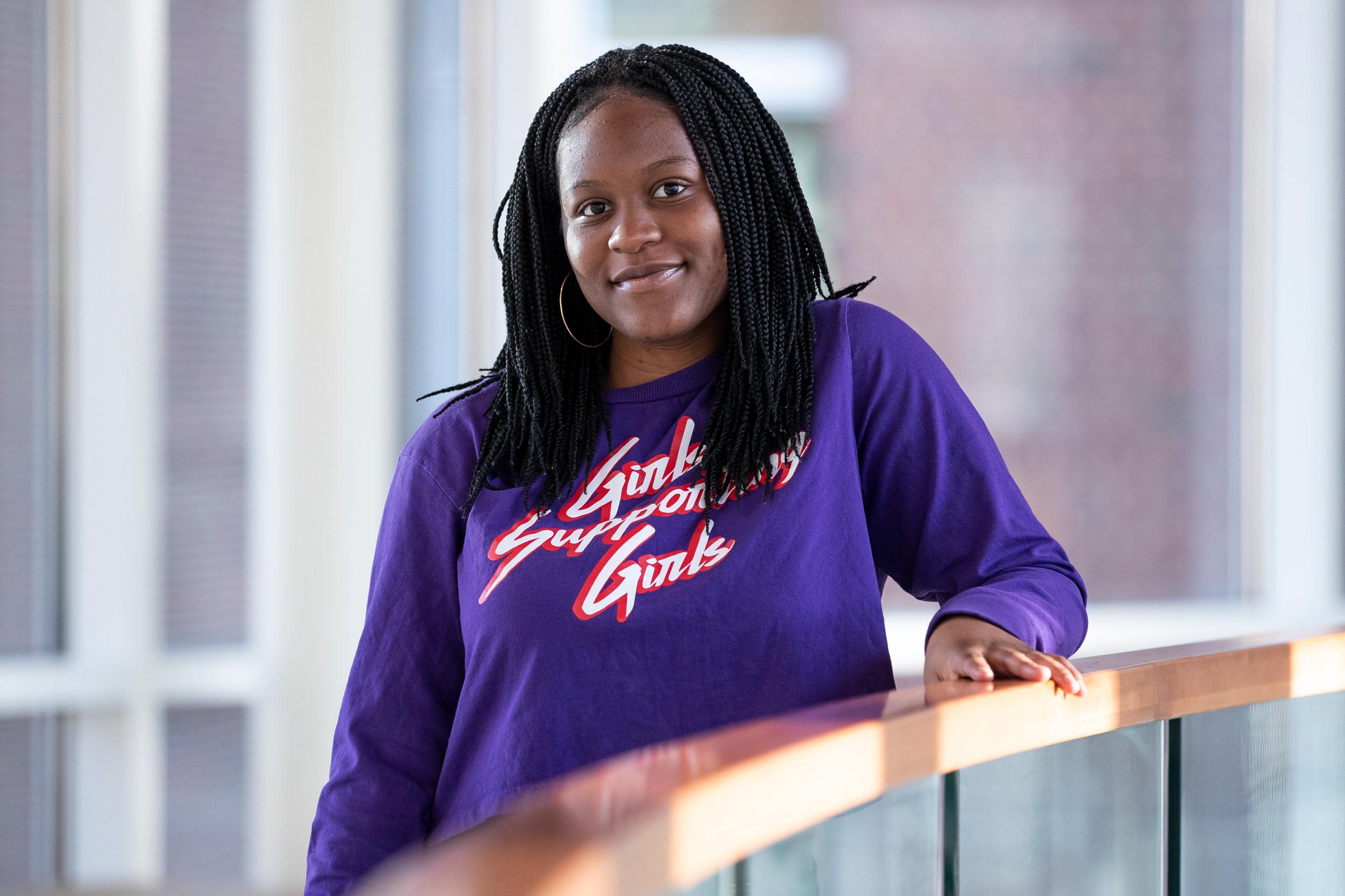
Jahmila Riley suggests future Blue Ridge Scholars “make sure you take time to breathe and take care of yourself.” (Photo by Sanjay Suchak, University Communications)
Riley: I will remember the friends and relationships I established during my college career. My highest accomplishment would be getting four A’s in my third-year spring semester.
Morgan: I have experienced some “impostor syndrome” while at UVA, particularly considering the disparities between my hometown and the places many other UVA students are from, so I often questioned whether I was smart enough to be here.
Getting inducted into Tau Beta Pi, the engineering honor society, was a big achievement for me because it made me realize that I had just as much right to be here as anyone else.
Roark: Getting research experience with one of the best-known and respected scholars in American archaeology. Enjoying the green spaces around Grounds, and especially discovering the tucked-away spots that are all the most special because they come as a surprise (maybe I’m sentimental because it’s spring, but Grounds really is beautiful!).
Learning how to be less intimidated by adulthood, and learning how to do seemingly basic “adult” tasks that are intimidating at first – signing a lease, doing taxes, being proactive about life in general. Also realizing that I’m not alone, but I will be fine out there in the world on my own.
Having weird unexpected conversations with friends and strangers that I met in all sorts of places. Just today, I had a conversation with a classmate about his idea to create a machine learning app that can record birds singing in the forest and then identify the species by searching other recordings posted to the internet. The students here are creative and brilliant. It just makes me excited to go on knowing people like that are out there and all around me.
Q. How would you summarize your overall experience at UVA?
Riley: Challenging, but rewarding. Being a UVA student can be difficult at times, especially with the need to succeed and balance so many things at once, but you come out stronger than when you came in because all of your missteps and failures become lessons learned.
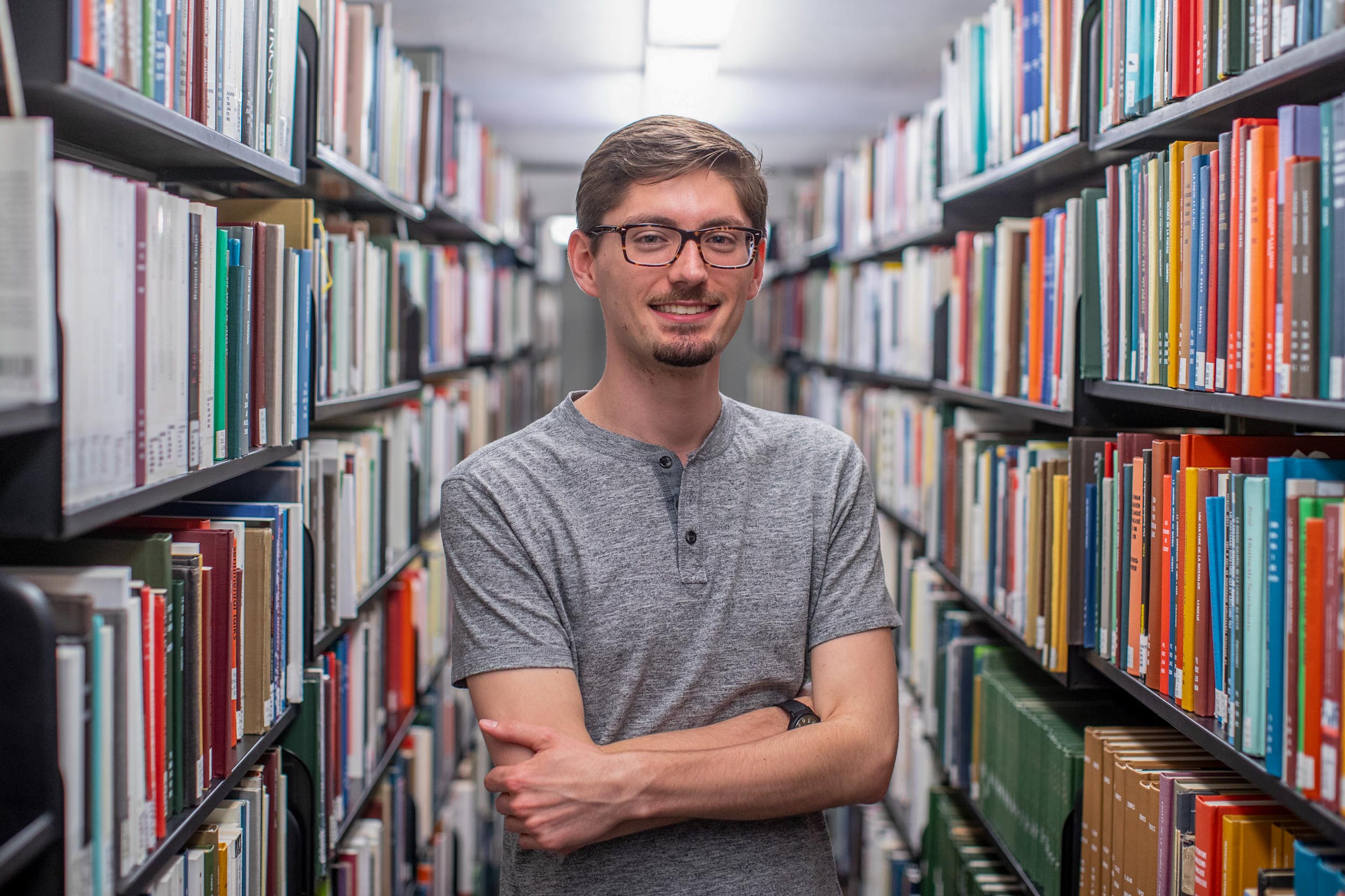
Edward Morgan recommended that future scholars “Never forget where you come from. … Remember that your background is different from everyone else’s, and use that to give you the strength to push on.”
Morgan: I don’t think first-year Edward would recognize me now. The personal and professional growth I’ve experienced while at UVA has been instrumental in making me the person I am today. The academic rigor is challenging and rewarding, and I don’t think I’ve had a bad professor for any class. However, UVA students are also interested in extracurriculars – whether that be clubs, sports or volunteering – and because of that there’s an organization for practically everything. Having that safe space to explore what interests you outside of schoolwork is part of what distinguishes UVA from other schools.
Ross: My experience at UVA was terrific, and I think it was really because of the people that I surrounded myself with during my four years here. I will leave this University with a great deal of knowledge and friends for life.
Rogers: Phenomenal! Despite challenges and a variety of heart-wrenching events, I would not have wanted to complete my undergraduate education anywhere else. Not only did it bring me so many moments of happiness and a sense of pride, it also forced many of us to grapple with difficult issues and leave our mark on history as we want it to be known.
Roark: I had a wonderful experience here that I wouldn’t trade for anything. It wasn’t the glamorous wild ride that college is often romanticized to be – I didn’t get super-involved in organizations, I didn’t become close friends with my first year hallmates, et cetera. I did come out with a solid GPA, a lot of new ideas, a long list of practical skills and experiences, and a lot more confidence.
Q. What would be your advice for future Blue Ridge Scholars?
Ross: One, UVA (and college) is a place to take risks, so do it in any way possible. If you have an interesting idea, just go for it. If you have a way that you think that you can change this university for the better, don’t settle, just go for it! You might’ve faced limitations in your past, but really use all of the resources here to set you up for success in the future.
Two, try to meet people who aren’t like you. Try to meet people with diverse backgrounds, and try to go out of your comfort zone to meet people that don’t think like you. After college, you will be a more confident person and will be able to more easily interact with people from various backgrounds.
Three, be mindful. Really try to understand yourself, and be honest about your strengths and weaknesses. Take time for self-reflection. The better that you are as an individual, the better you can make others around you.
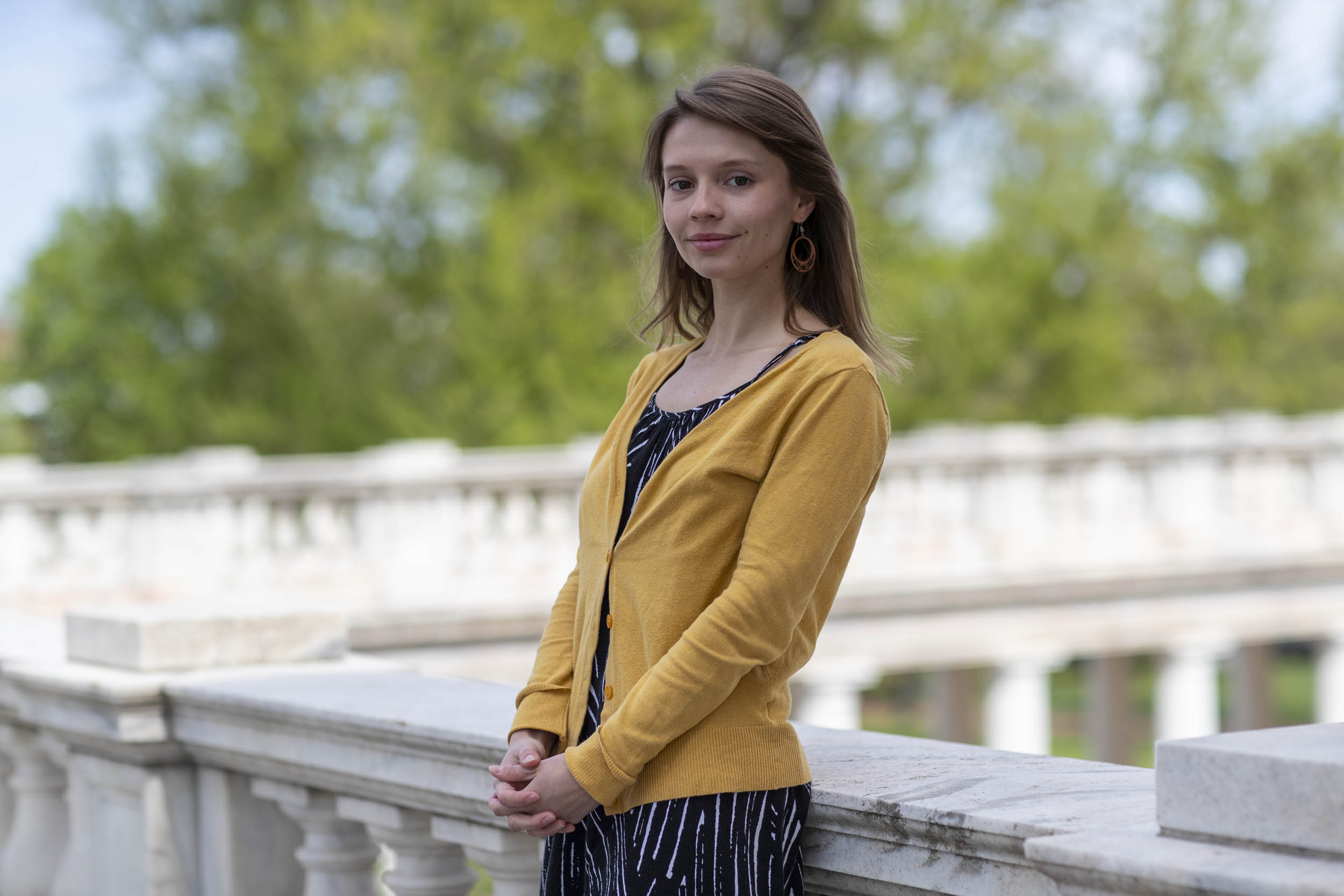
Courtney Roark advises future scholars to “take advantage of all the scholarships and support that the University community has to offer. (Photo by Sanjay Suchak, University Communications)
Four, don’t be afraid to fail. If you aren’t failing, then you aren’t trying hard enough.
Rogers: Although we are frequently told that “your experience is what you make it,” and it seems somewhat clichéd, it is incredibly true. I encourage all future Blue Ridge Scholars to fully engulf yourself into this community, explore and take in all that this place has to offer. You’ll be shocked at how much you will learn about yourself, but also how much you can contribute to an ever-progressing institution and environment. But, most importantly, have fun!
Riley: My advice for the future Blue Ridge Scholars would be to make sure you take time to breathe and take care of yourself; things will get overwhelming, but with support from family, friends and UVA’s resources, you will survive college! You got this!
Morgan: Never forget where you come from. Things will inevitably get tough, and you may doubt whether you can live up to expectations. Just remember that your background is different from everyone else’s, and use that to give you the strength to push on. Whether that means going home for a weekend to see family or keeping up with friends from high school, holding onto your identity is crucial when you’re in college, where so much of your world changes.
Roark: As part of the generation that was just learning how to conceptualize money during the 2008-09 recession, I tend to carry a lot of fiscal anxiety and fear that financial stability is an illusion. I’m not sure if the generation immediately following mine shares this pattern, but for those out there who do, my advice is to be confident and take advantage of all the scholarships and support that the University community has to offer. There are SO many awards out there that go undistributed because not enough people apply.
The simple truth is that the more financial support any student has, the more career-oriented opportunities they are able to pursue, instead of having to devote time and energy to a job that pays the rent without developing their career. If you want to pursue an internship or other opportunity that’s not paid, UVA has grants available to cover your cost of living. If you want to study abroad, even though you aren’t able to pay for it yourself, there’s money out there specifically for that purpose.
As more and more students like you get involved in these activities, those activities will become more and more accessible (fiscally and conceptually) to future students in need.
Media Contact
Article Information
April 16, 2019
/content/first-full-class-blue-ridge-scholars-set-walk-lawn

